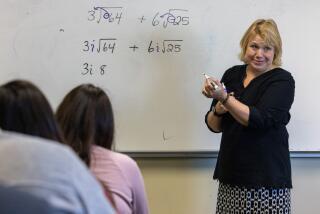COUNTYWIDE : Computers and Math: Too Smart?
- Share via
For centuries, mathematicians have solved complex arithmetic and advanced math problems in the same rudimentary fashion--with a pencil, paper and brain power. But computer technology now looms on the brink of revolutionizing that practice, some mathematicians say.
One cutting-edge, math-computer program, called “Mathematica,” is capable of computing nearly any mathematical challenge--from basic arithmetic to algebraic matrices to the most advance calculus problem--with the touch of a button. In Orange County, Cal State Fullerton and UC Irvine offer lab courses in Mathematica for advanced calculus students.
Golden West College this semester introduced the county’s first community college course in Mathematica, which local university and college math experts say is one of the most powerful and diverse of the math computer programs on the market. In their opinion, Mathematica represents a monumental leap in the study and professional application of mathematics, engineering and physics.
“I predict in five years, everyone who does mathematics is going to do it this way,” said Jack Wadhams, a math professor who teaches Golden West’s Mathematica course.
The program, they say, will attract more students to mathematics, enable students to move beyond tedious calculations to pursue more complex concepts, and open new avenues of research for advanced students and math and engineering professionals.
Other mathematicians, such as Cal State Fullerton’s John Mathews, are more reserved in their praise for the technology. Based on the Mathematica lab classes he began teaching last fall, “I can’t give a whole bunch of glowing support,” he said. “It will take a long time before I can say students are going to be learning better with this product.”
But, Mathews added, “it is revolutionary. Eventually, it will have a very large impact on the way we teach mathematics.”
To date, the program has made its greatest inroads in the hands of engineering professionals, Mathews said. Mathematica “is a serious research tool to handle complex problems” for engineers, he said. “It works well with very complicated subjects.”
But mathematicians say the program’s key drawbacks are the consequences of its powerful calculating abilities.
For example, it can actually calculate too well at times, Mathews said. Mathematica deals in complex-number answers, when simpler solutions may be more accurate in some cases, he explained.
“It is so robust, it can start solving things and giving you answers . . . that are wrong,” he said.
Additionally, some mathematicians acknowledge that the new technology poses an ethical problem for academics. Because complex calculations are made so simple, Mathematica may encourage students to take a shortcut through their trigonometry or pre-calculus homework.
“This is one of the dilemmas of our age,” Wadhams of Golden West said. “We, as mathematicians, have to decide what (skills) we teach in mathematics (are) worth using anymore.”
But others, such as Orange Coast College math professor John Clark, disagree. The elimination of rote computation, Clark said, marks an inevitable step in the evolution of math. “We’re just moving from one set of tools to another set of tools,” he said.
More to Read
Sign up for Essential California
The most important California stories and recommendations in your inbox every morning.
You may occasionally receive promotional content from the Los Angeles Times.













